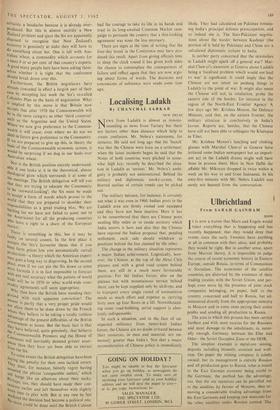Localising Ladakh
By CHANCHAL SARKAR
NEW DELHI
NEWS from Ladakh is almost as remote- sounding as news from Tartary but there are factors other than distance which help to create confusion. Mr. Nehru's statements, for instance. He said not long ago that his 'hunch' was that the Chinese were keen on a settlement; when the latest incidents began he said that the Notes of both countries were pitched in some- what high key; recently he described the situa- tion in Ladakh as `serious.' Mr. Nehru's ambi- guity is probably not unintentional. 'Behind the military and diplomatic smoke-screen, the blurred outline of certain trends can be picked out.
The military balance, for instance, is certainly not what it was even in 1960. Indian posts in the Ladakh area are firmly rooted and equipped and they have not been inactive. Here it has to be remembered that there are Chinese posts nestling fifty miles or so inside territory which India asserts is hers and also that the Chinese have rejected the Indian proposal that, pending settlement, each side should withdraw to positions behind the line claimed by the other.
The change in the military situation represents a major Indian achievement. Logistically, how- ever, the Chinese, at the top of the Aksai Chin plateau and with a good road system behind them, are still in a much more favourable position. For the Indian forces, also on the plateau but with mountainous terrain behind them, can be kept supplied only by airdrops, and to transport every single round of ammunition needs as much effort and expense as carrying forty men up four floors in a lift. Notwithstand- ing some road-building, aerial support is abso- lutely indispensable.
In such a situation, and in the face of un- expected militancy from better-knit Indian forces, the Chinese are no doubt irritated because their resources, in men and material, are im- mensely greater than India's. Not that a major reconsideration of Chinese policy is immediately likely. They had calculated on Pakistan remain- ing India's principal defence preoccupation, and so indeed she is. The Sino-Pakistani negotia- tions about the border between Kashmir (the portion of it held by Pakistan) and China are a calculated diplomatic irritant to India.
Is neither party concerned that the skirmishes in Ladakh might spark off a general war? Mar- shal Chen-yi's statement at Geneva about Ladakh being a 'localised problem which would not lead to war' is significant. It could imply that the Chinese are not intent on pushing things in Ladakh to the point of war. It might also mean the Chinese will not, in retaliation, probe the eastern side of the border, for instance in the region of the North-East Frontier Agency. A few days ago Mr. Krishna Menon, the Defence Minister, said that, on the eastern frontier, the military situation is conclusively in India's favour. Reports say, besides, that the Chinese have still not been able to subjugate the Kharnpas in Tibet.
Mr. Krishna Menon's lunching and clinking glasses with Marshal Chen-yi at Geneva haVe irritated some Indian newspapers but an import- ant act in the Ladakh drama might well have been in process there. Here in New Delhi the affable Mr. Mikoyan dropped in twice within a week on his way to and from Indonesia. In his sixty-five minutes with Mr. Nehru Ladakh was surely not banned from the conversation.






























 Previous page
Previous page